No Place For a Lady Read online
Page 5
The ladies were too nervous to venture outside the barracks by themselves, but in the late afternoon when Charlie returned from his duties they went exploring, taking a small boat known as a caïque across the water to the European side of town. They lay back on cushions, barely higher than the water level, while a dark-skinned sailor, in an open white shirt that showed off his chest, steered them around the huge ships traversing this international shipping channel. On arrival they hired a guide who took them by landau to a magnificent mosque, where gilded domes were balanced on top of each other like oranges in a bowl; to the Sultan’s Topkapi Palace set in lush pleasure gardens; and to Lucy’s favourite place of all, the Grand Bazaar, a maze of stalls under a wooden roof selling more goods than she could ever have dreamed of. The guide warned them that it was easy to get lost so they concentrated on keeping their sense of direction, but even so within ten minutes had to admit, giggling, that they were completely disorientated. The stallholders wore flowing robes and a headdress, and many were smoking hookah pipes that gave off aromatic scents. Lucy saw a few women wearing loose-fitting gowns of Eastern colouring, their heads and faces covered in veils; they flitted into doorways and through archways like elegant tropical moths.
On one stall Charlie spotted an intricate ship in a bottle with a painted backdrop of the minarets of Constantinople and he picked it up. ‘How much?’ he asked the stallholder and when he heard the price, he mimed great shock. ‘That’s over a shilling,’ he told Lucy. ‘They must think me a fool.’ He put the trinket back, upon which the stallholder lifted it and pressed it into Lucy’s hands, naming a figure that was about half of the original offer.
‘Lucy, put it down,’ Charlie instructed in a low voice. ‘We’re going to walk away and see what happens.’ She did as he asked. Instantly the stallholder came after them, grabbing Charlie’s arm and indicating in mime that he was a poor man, that he had children to feed. He caught Lucy’s eye, making a sad face and miming the rocking of a cradle and she flushed. Charlie shrugged with open arms; it was none of his concern. The stallholder suggested another price. Charlie shook his head. It was a good-natured game and it seemed to Lucy that Charlie’s gambling skills came in handy: he could keep a straight face and not give away his tactics. Eventually a price was agreed that was about a tenth of the original and Charlie counted out some coins and handed them over, whereupon the stallholder wrapped the ship in a bottle in fine tissue paper.
Lucy and Charlie chuckled as they walked away. When she turned back, the stallholder was watching them with an inscrutable expression. She got the feeling he didn’t approve, whether of her or of both of them she couldn’t tell, and it made her nervous. She knew that Muslim women covered their hair with veils, and wore high-necked, long-sleeved tunics to disguise their figures, yet here she was wearing a short-sleeved gown patterned with rosebuds, her blonde hair visible beneath her bonnet. Did the market stallholders look down on her? She didn’t like all the stares she was attracting, sensing an element of hostility in them.
‘I have some news, darling,’ Charlie told her, ‘and I don’t want you to worry about it. Promise you won’t?’ He made her swear with hand on heart before he would continue. ‘Lord Lucan wants to leave women behind in Constantinople when we sail to Varna.’
Her consternation registered on her face but all she could say was ‘Oh.’ She would be scared in this city without him. She was even nervous by his side. She couldn’t bear to think of them being separated.
‘However, I think he will face a mutiny if he tries to enforce it. Bill and I have discussed it and decided that if you and your lady friends board the ship tomorrow morning, take up residence in your cabins and refuse to leave, I can’t believe he will dare to drag you off, petticoats flying.’
‘Why does Lord Lucan not want us to come?’
‘We’re going to be camping at Varna and I suppose he imagines the conditions will not be suitable for ladies. But I think you have proved on the voyage out here that you are remarkably resilient.’
Lucy hesitated. She had never slept in a tent before and wondered whether it would be safe. Would they have to sleep on the ground? How would she manage her toilette in privacy? She did not want to lower his opinion of her resilience so she simply asked, ‘Will Adelaide be coming?’
‘Bill certainly hopes she will.’
She nodded. ‘Then of course I will. I’ve brought many home comforts to turn our tent into a palace where you can relax after your duties. This is exactly what I came for. I’m not about to turn back now.’
Charlie grabbed her and pulled her to him for a kiss, his arm curled around her waist. She sensed rather than saw the disapproval of the Muslim stallholders who surrounded them. When she looked up, their expressions were blank but they were all watching in a way that definitely didn’t seem friendly.
Chapter Six
The quayside at Varna was milling with soldiers of different nationalities – noisy Greeks in olive green, golden-skinned Ottomans in purply-blue tunics with a red fez cap, the French in red trousers with blue jackets, plus others whom Lucy couldn’t identify – and everywhere there were piles of cannonballs and shells. The town itself was small and whitewashed, its pot-holed streets broiling in fierce heat. While Charlie oversaw the disembarkation of the horses, Lucy and Adelaide strolled along the main street purchasing supplies to supplement the army rations they would receive in camp later: a loaf of black bread, a side of ham, a bag of lemons. Lucy hesitated over a bottle of milk because Charlie didn’t like tea without milk, but Adelaide warned her that in this heat it would surely turn before they could pitch camp.
A much-decorated officer scowled at them as he hurried past. He wasn’t wearing a helmet and they could see that the top of his head was quite bald while hair grew profusely down the sides and around his chin in an elongated U-shape.
‘That’s Lord Lucan, commander of the cavalry,’ Adelaide whispered. ‘His plan to stop ladies accompanying the army has been sorely thwarted. I don’t think any women stayed behind – certainly none of the Hussars’ wives.’
‘I hope he has more influence over his men than he does over us,’ Lucy giggled.
Charlie ordered two of his men to bring their luggage ashore and load it onto a gun carriage, which was a relief to Lucy, who had a niggling worry about bringing too much, especially in comparison to Adelaide who had only a modest bag. That night they were to sleep outdoors on a large plain alongside a lake, before travelling north the following day. It was a pretty spot as the sun began to set, with flocks of graceful white birds swooping down to rest on the water then lifting off in a giant cloud. Some folk set about erecting tents but Charlie peered at the sky and decided there was no need for shelter that night.
‘I don’t expect you have ever slept under the stars, my dear. It’s a glorious experience in a climate as temperate as this. Everyone should try it.’ He began arranging their bedding underneath a sprawling bush.
‘Will we be safe?’ Lucy asked, all kinds of worries simultaneously crowding her brain: snakes, scorpions, Russian soldiers …
‘We’re surrounded by the bravest and best of the British army, my love. What could possibly happen?’
He built a little campfire on which to boil water for tea, and in lieu of milk he added a glug of rum to his cup.
‘Anyone care to join our party?’ he called to those round about. ‘Bring your own hooch!’
Bill and Adelaide joined them, and several of the men, all passing round their bottles. Mrs Williams and her husband Stan perched on the edge of the group, and she and Lucy exchanged smiles.
‘What about a sing-song?’ Charlie suggested, and burst into a tenor rendition of the popular ballad, ‘Thou art gone from my gaze, like a beautiful dream’. He sang the first verse, then turned to Lucy: ‘I don’t know any more of the words, my dear, but perhaps you do?’
She took over – ‘In the stillness of night, when the stars mildly shine’ – and the group fell silent as they listened to
her pretty singing voice, quite the finest many of them had heard. For years she had been studying under an Italian singing master, hired by her mother so that there would always be music in the house. Lucy put her heart into it, wanting Charlie to be proud of her.
When she reached the end he cheered ‘Bravo!’, and the others joined his applause. One soldier piped up with the lively ‘Cheer, boys, cheer!’ and Charlie rose to his haunches and began a clumsy Cossack dance, hopping, kicking and falling over in a parody of the well-known Russian dance style. Everyone laughed until their sides hurt. It was clear he was the company jester and Lucy suddenly felt a pang of sadness that her mother never met him. Their characters were so similar she was sure they would have got along famously. Mama would never have allowed Dorothea to cause this horrid rift in the family. She would instantly have welcomed Charlie as one of them.
When Lucy crawled into her bedding later, Charlie was inebriated and keen to make love. He cupped her breast, squeezing it a little too hard, while trying to push up her skirts.
‘We can’t,’ she shushed. ‘Others will hear.’ The nearest men were only ten paces distant and although they appeared to be asleep, Lucy didn’t want to risk them seeing or hearing anything compromising. Charlie grumbled but soon gave up, fell back on his bedding and began to snore.
Lucy lay awake, alert for movements on the ground. Dorothea’s words about scorpions and snakes echoed through her head, but all she saw in the moonlight was a large beetle with yellow markings and sharp black pincers. She watched it for a while, wondering if it might bite her in her sleep. And then she reminded herself that she was a captain’s wife, who must be strong to survive this extraordinary experience. She picked up a rock and crushed the beetle, then settled down to sleep.
Bugles sounded at daybreak and everyone rose to pack any belongings that had been unpacked the night before. Lucy washed her face and rearranged her hair, smoothing down the creases in her pale blue silk gown as best she could. They were travelling eight miles north to a place called Silistria, where the Russian forces were under siege by the Ottomans, and Lucy felt a knot in her stomach when she thought about that. But for now, Charlie helped her and Adelaide to climb onto a gun carriage to ride with their luggage and they enjoyed the drive through the countryside while it was still early enough to escape the glare of the sun: the sky was cloudless but a light breeze made the temperature pleasant.
Adelaide transpired to be something of an expert on wildflowers and plants and she identified the blooms they passed in fields and hedgerows: wild roses, larkspur, borage, even purple heather, which Lucy had always thought to be uniquely Scottish. ‘I enjoy gardening,’ she explained. ‘We have a pretty garden at our house in Oxfordshire.’
When they arrived at Silistria, the French had already set up camp on one side of the plain, and Lucy caught sight of the red fezzes of the Turkish soldiers further off. The area left for the British troops lay on swampy ground near a river and black clouds of flies rose into the air as they stepped on it.
‘We’ll have our work cut out making this a home from home, but I’m sure we’re up to it,’ Adelaide called cheerfully.
They chose a patch that was slightly drier than the rest and some soldiers helped to unload Lucy’s trunk and bags onto the ground. Charlie and Bill approached, joshing each other.
‘I’ll put a plug in your nose if you snore as you did last night,’ Bill told Charlie, while Charlie insisted that Bill’s socks must never be allowed in the tent.
‘What’s going on?’ Adelaide smiled at them.
Charlie answered: ‘They brought four-man tents. Bill and I have decided we’d rather share with you ladies than with any of our men – if that’s acceptable to you, of course.’ He bowed theatrically.
‘I’ll hang a sheet down the middle so we have a modicum of privacy,’ Bill added.
Adelaide and Lucy looked at each other and agreed. In fact, Lucy felt greatly relieved that her friend would be so close at hand, even during the night. It would make her feel safer. She wondered what Dorothea would make of her sleeping under canvas. She would be forced to revise her low opinion of her younger sister if she saw how well she was coping with army life. Just the thought of Dorothea made her feel cross. Lucy shook her head, trying to erase the memory of their argument.
The men erected the tent in minutes then had to return to other duties, so Lucy and Adelaide began arranging their possessions, agreeing where the food store should be kept, where the washbowl should sit. There was nowhere to hang clothes so they had to stay folded in the trunk. Lucy’s tin bath could be used for bathing and also for washing clothes.
‘Isn’t it strange to think the Russians are so close, perhaps just a mile away?’ Lucy mused. ‘I haven’t heard any sound of their presence. Have you? I thought maybe there would be gunfire …’
They both stopped to listen but the only sound was the chirruping of insects in the long grass and the idle chatter of soldiers as they set up camp. The sun was a huge white orb and there was no shade from its unrelenting fire except inside the tent, where the air was stuffy and close. The ladies drank some tea, then loosened their corsets and lay down on their bedding rolls to snooze through the hottest hours of the day.
Chapter Seven
Two weeks after their arrival at camp, Charlie and Bill returned from the front with news that the Russians had abandoned Silistria and pulled back across the Danube. ‘We could be on the move again soon,’ Charlie warned, but they waited and no orders came. Meanwhile, the women had slipped into the rhythm of camp life. Every morning, before the heat grew too fierce, Lucy and Adelaide walked out to nearby farms to try and purchase fresh food to augment the chewy salt pork and tasteless dried biscuits distributed by the army. They didn’t speak the language, of course, but the local men seemed receptive to Lucy’s pretty face and Adelaide’s friendly smile and they were usually able to buy a loaf of sour black bread, gritty with sand from the floor on which the dough was kneaded, and perhaps some butter. Occasionally they were offered a few eggs or a scrawny chicken, but the only vegetables available seemed to be onions.
After a nap during the hottest hours, Lucy would venture out to call on some of the other women and chat to them as they washed clothes in the river or sat in the shade of a stand of trees. She began to know several: Mrs Williams, who had now resigned as lady’s maid to Fanny Duberly – ‘I can’t say I’m surprised,’ Lucy told her with a conspiratorial twinkle – and Mrs Blaydes, who had taken her place; Mrs Jenkins, a forthright Welshwoman, and Mrs Higgins, who was said to have too much of a taste for alcohol but whom Lucy found shy and very companionable. She noticed that the women had shed their corsets and petticoats in an attempt to keep cool; in fact, she caught a glimpse of Mrs Williams’ bare leg one day and realised she wasn’t even wearing drawers. Lucy still wore all her layers in order to maintain a fashionably full skirt; she was determined not to let her standards slip, even though the intense heat meant her undergarments were often drenched in perspiration. In her head, she frequently argued with Dorothea: ‘You see? I am sleeping in a tent, making tea on a campfire and, contrary to your expectations, I am perfectly capable of looking after myself.’
At night, they dined with the men on greasy communal stews doled out with slices of gritty bread, unless they had procured a chicken that day, in which case Adelaide roasted it over the fire with great competence. Lucy had never learned to cook and she watched carefully, eager to learn. After dinner, Charlie usually instigated the entertainment: sometimes it was a card game or a musical evening, but he also developed the raucous new sport of beetle racing. The men prowled the undergrowth collecting beetles then raced them along a length of sheet. They placed bets on the likely winners then cheered on their own creatures, to whom they gave names: Horatio the Horrible, Nimrod, Lucan and Raglan (the last two named after the cavalry commander and the army’s elderly general).
Bill didn’t care for gambling so he kept the ladies company on these evenings, conversi
ng about books and music, or telling them what he had learned about the progress of the war: there were other fronts being fought in the Baltic, in the Eastern parts of Turkey and in Crimea, and it seemed possible they might be redeployed to one of them now the Russians had left Silistria.
‘I wish they would make their decision soon so we can fight our battles and go home,’ he told Lucy. ‘I can’t tell you how much I miss our little ones bouncing on my knee, or climbing all over me while pretending I am a big bear.’ He chuckled. ‘I love to hear them chattering in their serious little voices. Martha has an opinion on everything and is not shy of expressing it.’
‘He can never deny her,’ Adelaide smiled. ‘If I have refused her anything, she will go to her father and extract his consent in an instant. He can’t resist her.’
‘It’s true,’ Bill grinned. ‘You remind me of her, Mrs Harvington. I think you have steely determination beneath that pretty exterior.’
Lucy laughed. ‘Thank you for the compliment, sir. I certainly hope I am more than merely decorative.’
At bedtime, Charlie returned to their tent and they made love quietly but Lucy blushed scarlet the next morning when Adelaide and Bill greeted her; she could hear when they had marital relations, just from a change in breathing pattern, a slight shifting of bodies, so she knew they must hear Charlie and her as well.
Weeks passed, June turned to July, and the men had little to do but tend their horses and race beetles. It felt like an anti-climax after all the excitement of the journey and Lucy wondered about the cause of the delay in getting new orders. Meantime, she was concerned that the horses drank from the river they used for their own drinking water, and she had been disgusted to see some soldiers urinating into it. She began to venture further afield to a spring where she collected buckets of water for drinking, enjoying the walk in the cooler hours of early morning. However, one day after she returned from such a trip she felt movement on her legs and lifted her petticoat to find a slimy black slug about two inches long stuck to her calf. She lifted the hem of her drawers to find another. She shrieked hysterically and couldn’t stop shrieking.

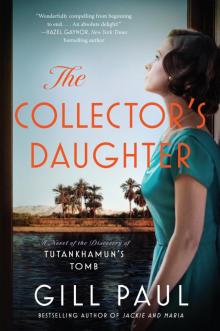 The Collector's Daughter
The Collector's Daughter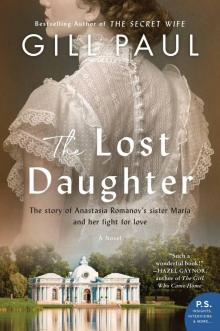 The Lost Daughter
The Lost Daughter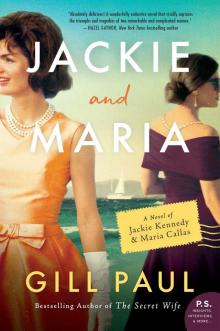 Jackie and Maria
Jackie and Maria The Affair
The Affair Love...Maybe
Love...Maybe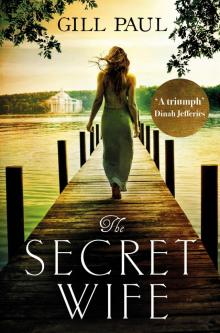 The Secret Wife
The Secret Wife No Place For a Lady
No Place For a Lady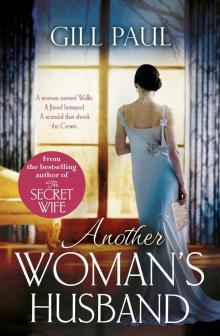 Another Woman’s Husband
Another Woman’s Husband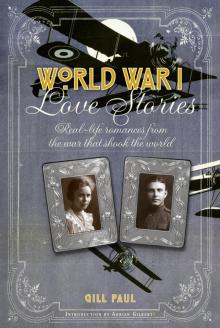 World War I Love Stories
World War I Love Stories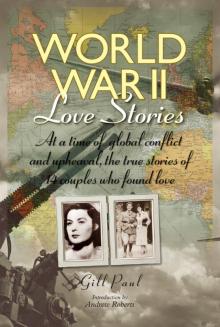 World War II Love Stories
World War II Love Stories